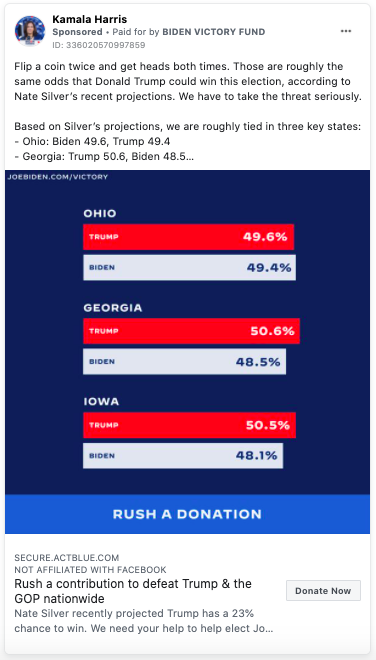The news: The NYU Ad Observatory released new data this week about the inputs the Trump and Biden campaign are using to target audiences for ad campaigns on Facebook. It’s a jumble of broad and specific characteristics ranging from the extremely wide (“any users between the ages of 18-65”) to particular traits (people with an “interest in Lin-Manuel Miranda”). Campaigns use these filters—there are usually multiple ones placed on each advertisement—to direct advertisements to segments of Facebook users in attempts to either persuade, mobilize or fundraise. The data shows that both campaigns have invested heavily in personality profiling using Facebook, similar to the tactics Cambridge Analytica claimed to do in 2016. It also shows how personalized targeting can be: campaigns are able to upload lists of specific individual profiles they wish to target, and it’s clear from the study that this is a very common practice.


How targeted ads work: Campaigns create voter outreach strategies by using models that crunch data and spit out predictions about how people are likely to vote. From this they identify which of those segments they hope to fundraise from, persuade or turn out to the polls. Facebook, meanwhile, provides advertisers with a set of ways to target those users including basic demographic filters, a list of user interests or the option to upload a list of profiles. (Facebook creates the list of subjects their users might be interested in based on their friends, online behavior.) Campaigns use personality profiles to match their segments to the Facebook interests.
When campaigns upload lists of specific users, however, it’s much less clear how they identified who to target and where the profile names came from. Campaigns often purchase lists of profile names from third parties or create the lists themselves, but the provenance of how a campaign matched a voter to a Facebook profile is excruciatingly hard to track.
The data: The data isn’t comprehensive or representative, as it comes from about 6,500 volunteers who have chosen to download the Ad Observer plugin. Facebook doesn’t publish this data, so voluntary sharing of data is the only window into this process. That means it’s hard to draw a fair comparison between the campaigns or take a broad look at what they are doing. Working with the Ad Observatory team, we were able to pull out some examples of filters and the ad pairing served to that targeted audience, included in this story. You can explore the rest of the data at the bottom of this dashboard.
How to interpret it: The NYU researchers say there are some insights to be gleaned. First, it’s clear campaigns are continuing to experiment and invest in targeted advertising campaigns on Facebook. The researchers also said that advertisements created with custom lists tended to be used for persuasive messaging. It’s unclear exactly why this is, but there is a lucrative industry around finding and messaging to voters who might be persuadable.
Most of the ads created using the specific filters around interests were meant for fundraising purposes, though not exclusively. Fundraising ads are targeted to base supporters, so it could be that campaigns have more sophisticated models (and better data) about the interests and personalities of their own supporters.
What this means for political microtargeting: In 2016, Cambridge Analytica was accused of using Facebook data to create personality profiles of potential US voters. It claimed to identify those people likely to be persuaded to vote for Trump based on this personality mapping. There’s no evidence that it worked, but Laura Edelson, an engineer at Ad Observer, said “I don’t actually know of any evidence that it’s not effective either.” She noted “it could be ineffective and still harmful.” The continual investment into this kind of profiling and segmenting indicates that this kind of data driven, large-scale microtargeting has only grown and become mainstream.
There’s nothing worse than lighting a new candle and watching it sputter out, tunnel, or…
Discover how woven metal fabric transforms restaurant design with its versatility, from feature walls to…
Upgrading your workspace? Get inspired by design ideas for materials, lighting, and amenities, and tips…
In recent years, the global interest in peptides has surged due to their wide-ranging benefits…
Maximize your workspace without overspending. Explore practical ways to expand your office using smart layouts,…
Discover how to create a thriving STEM community through hands-on, collaborative projects that are perfect…